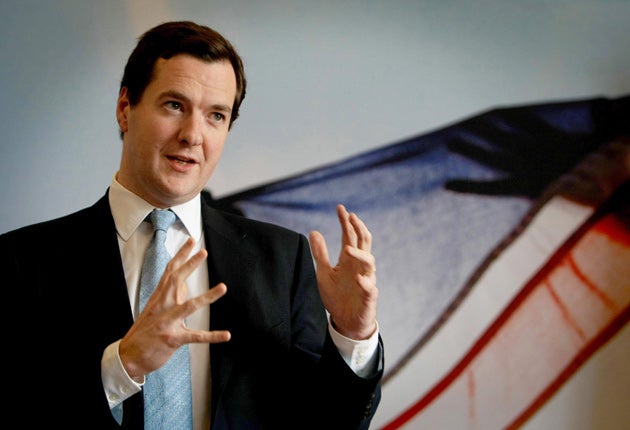Julian Knight: The Treasury doesn't trust the public, and we lose out as a result
It should drop the compulsory pension annuity purchase for a start

Facebook may be so 2008 but it's still capable of throwing up the odd gem. Take for example, the George Osborne fan club page which has a grand total of 197 members – including the heroically named Douglas Sproutface. (Please let that not be a joke.) In contrast, the Bristol rocker P J Harvey page has the small matter of 94,172 fans (including me). Who says people aren't in thrall to politics!
Nevertheless, the Osborne page is full of pics of the shadow Chancellor meeting constituents, groups of kids (no hoodies, I notice), speechifying and grinning as if he is in agonies normally only reserved for Dante's ninth circle of hell. In one bizarre Photoshop effort, George is a Thunderbird puppet – deficit reductions are go.
This week, though, George's page may have acquired one or two new fans – what with his proposals to bring to an end the compulsory purchase of annuities. He has rightfully recognised the nanny state injustice of forcing people who have saved hard to put their money into a pension being forced to buy an annuity by age 75. For most pension savers, annuities are the best choice and often earlier than age 75 – they give a guaranteed income for life which can be a cornerstone of retirement planning. But to offer the option of an annuity is one thing; to compel the purchase of one is another.
The mindset at the Treasury has always been to distrust the public. It thinks that we can't allow pension savers the option to do what they want with their money because they will monkey it all on cruises, fast cars, golf and amateur dramatics or whatever and then go cap in hand to the benefit system. This is a crass insult to the intelligence and conscience of millions of pension savers who put money away partly because they want to have as little to do with government or the benefits system as witnessed by the Citizens Advice figures on low take-up explored on pages 90 and 91.
At the same time, the powerful insurance lobby wants annuities to stay compulsory because they are a money-spinner – particularly when the saver forgets to shop around for the best deal when it comes time to convert their cash pile into an annuity and end up accepting the inevitably lower rate offered by their pension provider. What's more, the Treasury benefits from the status quo because annuity providers, in order to be able to guarantee their returns to savers, invest heavily in government debt of which, as we know, there is a mountain to shift at present.
But what the naysayers have to realise is that making annuities voluntary won't kill the market: for most people, purchasing an income for life makes sense. In fact, getting rid of compulsion will help the sale of pensions. There are undoubtedly a lot of people out there who, rightfully, like the tax break available on pensions contribution but for whom the idea of being compelled to do something with their money is anathema. It's bad enough that, from April, the age at which we are able to access our pension cash will rise from 50 to 55. Trusting people with their money and reducing regulation is the only way to boost pension saving.
My fear is that if George Osborne does make it into 11 Downing Street, he will become imbued with the Treasury mindset that we're not to be trusted. What would his fans think of that?
Don't accept the Aviva deal
Has the insurance industry learned nothing from the mis-selling scandals of the 1980s and 1990s? In yesterday's Independent Money section, the outrageous commissions available to independent financial advisers for moving their clients' cash on to Aviva's new portfolio system were laid bare – up to 10 per cent can be snaffled from investors for what amounts in many instances to a tiny bit of administration. The practice of paying commissions is due to end in a couple of years, and I can't wait. It's a fundamental fact of life that advisers, no matter how well intentioned, will be swayed by commission – otherwise why are they paid? – and it's all too tempting, if not to ignore the downside of investment, at least to massage them away in their own minds. In years to come, we will look back on commissions as something from the financial dark ages and be amazed and appalled that we allowed this patently anti-consumer practice to go on for decades.
Low-wattage regulator
British Gas's timely price cut didn't stop this from being a bad week for energy consumers. Not only were we warned by regulator Ofgem that we face possible shortages in a few years' time but also that prices will rise sharply to allow the big six power companies to continue to turn a profit while increasing infrastructure investment. Ofgem sees the inside track and the future projections but I can't help but feel that, like the Financial Services Authority, it is too close to the providers; unwilling to challenge them and afraid to take a stand. For instance, I can't remember the last time they took the providers to task over anything significant.
Subscribe to Independent Premium to bookmark this article
Want to bookmark your favourite articles and stories to read or reference later? Start your Independent Premium subscription today.

Join our commenting forum
Join thought-provoking conversations, follow other Independent readers and see their replies